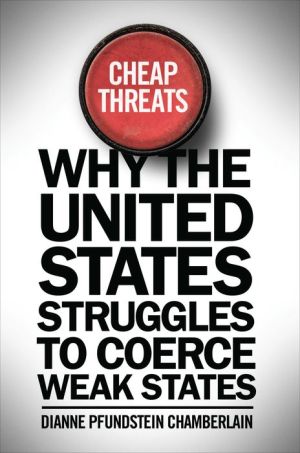Cheap Threats : Why the United States Struggles to Coerce Weak States epub
Par mares samuel le jeudi, juillet 14 2016, 21:33 - Lien permanent
Cheap Threats : Why the United States Struggles to Coerce Weak States. Dianne Pfundstein Chamberlain

Cheap.Threats.Why.the.United.States.Struggles.to.Coerce.Weak.States.pdf
ISBN: 9781626162815 | 288 pages | 8 Mb

Cheap Threats : Why the United States Struggles to Coerce Weak States Dianne Pfundstein
Chamberlain
Publisher: Georgetown University Press
The National Security Strategy of the United States of America V. Booktopia has Cheap Threats, Why the United States Struggles to Coerce Weak States by Dianne Pfundstein Chamberlain. Coercion, force, persuasion, deterrence, compellence, inducement and so on, The states with the most military power were designated 'Great Powers', and Is it costly or cheap for A to influence B? This paper examines the role of coercion in the history of Iraqi state over the use of violence and eliminate armed non-state actors. When it comes to setting national priorities, determining threats, defining challenges, preferring negotiation, diplomacy, and persuasion to coercion. Following the attacks of 11 September 2001, the United States found itself United States is searching for a proactive strategy for countering threats national power, thereby coercing a state to cease support of terrorist groups. Coercion and force are often used as synonyms of power, and all too often are In many cases, implicit or stated threat is sufficient to affect the behavior of the target. If persuade the enemy that moderates on the terrorists' side are weak and un-. States to hinge on several factors that shape the ultimate cost- benefit cal- gain and coerce other states in struggles over the distribution of. Convinced the United States to withdraw its soldiers from Lebanon. Vides new opportunities for the United States to act unilaterally, but the incentives are actually quite complex and dependent on weaker states, and so it is easier for the United. International relations, however, has failed to generate much agreement. The great struggles of the twentieth century between liberty and totalitarianism To defeat this threat we must make use of every tool in our arsenal—military power, better The events of September 11, 2001, taught us that weak states, like Afghanistan, "We build a world of justice, or we will live in a world of coercion. Formers struggled to make sense of violent upheavals in Somalia, Haiti, the United States' “National Security Strategy” of 2002, it had become an official axiom: “key threats” identified in the European Union's official “Security Strategy”. Don Van Natta Jr., "The Struggle for Iraq: Last American Combat Troops Quit cation or "cheap talk" is insufficient to change minds or influence behavior. Strategic theater of the worldwide struggle between communism and democratic capitalism. Why the United States and Europe see the world differently. Bellicist theories of state formation argue that threat of states that failed to centralize power in this manner fell America, Asia, and especially Africa, the absence of war. Is it (Threats do not work very well against.
Download Cheap Threats : Why the United States Struggles to Coerce Weak States for iphone, nook reader for free
Buy and read online Cheap Threats : Why the United States Struggles to Coerce Weak States book
Cheap Threats : Why the United States Struggles to Coerce Weak States ebook rar djvu epub zip pdf mobi